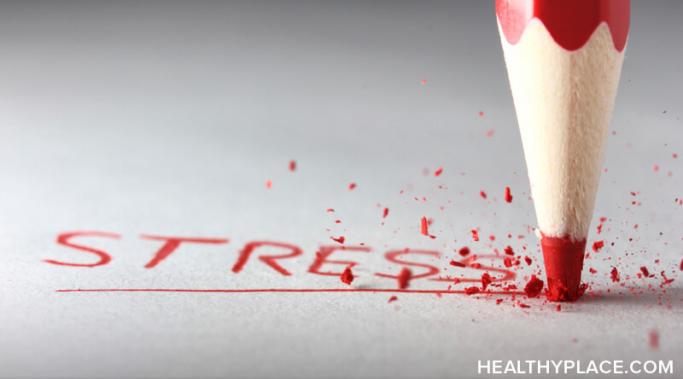Blogs
Understanding how stress from positive change adds to our stress load improves our self-care and helps us stay on the path to posttraumatic stress disorder (PTSD) recovery. While the word "stress" applies to life-altering situations like traumatic or stressful events as often as it pertains to a long to-do list, it is not typically associated with times when things are good. However, positive change and stress do exist together and it helps people with PTSD to recognize them when they occur.
How can I manage dissociation in the new year better than I did last year? This year, my dissociative identity disorder (DID) made celebrating the new year difficult. New Year’s Day could symbolize another year of dissociation, and another year of instability. But New Year’s can also be a time to recognize progress and to make resolutions that promote healing and change. That’s why I am choosing to make resolutions for my DID--I'm going to manage dissociation much better this year. You can, too.
If you increase your uncertainty intolerance, your anxiety level will decrease. Facing uncertainty—not knowing what is going to happen in your life on both big and small scales—can cause or increase anxiety. Being really uncomfortable with uncertainty, officially called uncertainty intolerance (and sometimes referred to as fear of the unknown), is common in people living with anxiety. If you find yourself worried, anxious, and stressed when you can’t predict what’s going to happen, here’s a helpful certainty: you can do something about this type of anxiety and increase your uncertainty intolerance, and overall mental health, in the process.
Feeling your emotions in eating disorder recovery can be unsettling at first. Eating disorders strive to brush uncomfortable emotions aside—to ignore the tension and medicate the suffering—but deep-rooted anger, insecurity, fear, grief, loneliness, rejection or similar emotions must be named and felt in order to achieve sustainable eating disorder recovery. Instead of masking the pain with harmful behaviors, it's crucial to acknowledge, identify, express and feel your emotions. This practice of tuning into your own emotionality creates space for self-awareness, compassion, acceptance and, ultimately, healing.
If you want to prevent anxiety as we enter the new year, better self-care may be on your list of resolutions. But how quickly do we veer off course when we set lofty expectations for ourselves? I’d like to offer some tips to help you build a self-care practice to prevent anxiety without exacerbating it in the process.
Life after an eating disorder, and treatment for both bulimia and schizoaffective disorder, is much better. I often write about my experience with schizoaffective disorder at HealthyPlace, but it was really my struggle with bulimia that led me to seek help in the first place. I struggled with my eating disorder for many years, and eating disorder recovery was rough until I was also treated for schizoaffective disorder. In my case, the two were definitely related. When my mood and psychotic symptoms were reduced with medication, I finally felt strong enough to really get a handle on my eating disorder. I spent several weeks at an eating disorder treatment center in my early 20s. I truly believe it saved my life, and during my life after an eating disorder, I haven’t looked back once.
What I've learned in life since my suicide attempt almost a year ago, has helped me make a great deal of progress in my depression journey. While major depressive disorder is still a daily battle I face, I now have new weapons in my arsenal which I can use in the war. I'd like to share with you what I've learned about life this year, and how this knowledge has made me stronger.
The idea of "normal" mental health affects me as someone who struggles with mental illness. I often fall prey to the idea that mental health is something I can only achieve by becoming more like “normal” people. In an age of health coaches and self-help gurus, it can be easy to believe that the ability to conform to a more widely accepted lifestyle is the answer to all mental health problems. Unfortunately, rather than offering a solution, the myth of normal mental health creates more stigma around mental illness.
Violence and verbal abuse against women are romanticized in many Hollywood movies, but perhaps none so blatantly as in Fifty Shades of Grey. Unsurprisingly, given the story originated from Twilight fan fiction, the popular erotic novel and subsequent movie smacks of emotional abuse. What are the real-life effects of movies that romanticize abuse against women?
Attention-deficit/hyperactivity disorder (ADHD) organization tips can come in handy since staying organized can be a daily struggle. This is why I try to write almost everything down in planners. Everyone has a unique organization system, so I want to share a taste of how I use planners, calendars, and lists to stay organized. Take a look at these ADHD organization tips that work for me.










I believe she will only be able to rid herself of her demons, and hopefully her BPD as well, when she's ready to confront the abuse of her father. If she can put the blame where it belongs, she may stop projecting that victim/perpetrator cycle on the present men in her life. These demons are a metaphor for the purgatory she has created for herself. That reality has consequences in the real world, but it need not be real in the tangible sense. Exorcising her demons will require the expenditure of real physical energy and probably the destruction of aspects of her personality. If this ever happens, and it's possible but not probable, then these demons will evaporate. They are only as real as one's personality is real. In short, reality is not the question, it's what you make of the things you feel to be real.